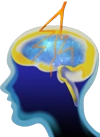Neurologist in nalasopara
What does a Neurologist do?
A neurologist is a doctor specializing in the treatment, diagnosis, and management of problems relating to the nervous system and brain. Neurologist Dr. Amit Shah treats various types of disorders, including migraine, headache, epilepsy, multiple sclerosis, convulsions, memory loss, stroke, and Parkinson’s disease.
Neurologists treat patients of all ages with a broad range of neurological medical conditions. The following are the top five most common conditions treated by neurologists:
Headaches – There are various varieties of headaches, including migraines (with and without an aura), cluster headaches, and tension headaches. All forms of persistent headaches may produce considerable discomfort and interrupt daily life. A neurologist can help minimize the frequency of headaches and prescribe medication to alleviate symptoms.
Seizures and epilepsy– Epilepsy and seizure disorders may be congenital (existing at birth) or acquired. They arise as a result of aberrant brain activity. Seizures significantly disrupt everyday life and might potentially cause brain damage. Neurology doctors may give you medication to prevent and treat seizures.
Stroke– A stroke is a medical emergency in which a portion of the brain’s blood supply is cut off. Immediate medical attention from a neurologist is necessary to minimize brain damage.
Dementia– The word “dementia” refers to a group of medical diseases that affect the brain and create symptoms such as memory loss, problem solving, and critical thinking. Neurologists in Borivali – Dr. Amit Shah can treat individuals with this illness by administering medication to alleviate symptoms.
Parkinson’s disease– Parkinson’s disease is a nervous system ailment characterized by low levels of a hormone known as dopamine. Tremors, rigidity, and alterations in thinking may result from this. Neurologists may prescribe drugs to alleviate Parkinson’s nervous system symptoms.
How to reach Garden View Hospital
Timing: 02:00 PM – 03:00 PM (Wednesday)
For Appointment Call: 98195 61456 / 85913 07624
Even minor changes in the neurological system may have far-reaching consequences and symptoms. Make an appointment with Dr. Amit Shah Neurologist if you are having any of the following symptoms:
– Changes in behavior
– Confusion, difficulty thinking, or memory issues
– Dizziness, as well as problems with balance and coordination
– Numbness, weakness, or movement difficulty.
– Seizures, syncope, or repeated staring episodes are all symptoms of epilepsy.
– Light or sound sensitivity.
– Recurrent severe headaches
– Having difficulty speaking, reading, or writing
– Tremors, or other uncontrollable motions
– Vision changes
– Significant alterations in gait or posture.
– Abnormal brain or spine imaging
For Emergency / STROKE Contact – 98195 61456

